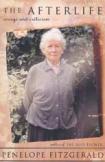Penelope's Pen
Penelope Fitzgerald’s family crops up often in her prose. She alludes to her two Victorian grandfathers (one the bishop of Manchester and the other of Lincoln); to her uncle, Monsignor Ronald Knox; and to another uncle and aunt, who spent their engagement in the 1890’s corresponding with each other on postcards, each one containing a reference to a poem in Palgrave’s Golden Treasury. As a child she heard Walter de la Mare read from Peacock Pie in the long-gone Poetry Bookshop in Bloomsbury.
These quiet asides bring us close to Fitzgerald’s worldliterary, high-minded, very English, but full of a novelist’s enjoyment of the rich flavor of individual incidents and domestic relationships. That novelist’s eye enriches the literary criticism collected here, and gives her erudition a lightness of touch and humor that is typical of her novels. It makes one want to rush out and read the minor writers, the odd Victorian memoirists whom Fitzgerald so loves. Although she died only four years agoand among the writings collected here are astute reviews of novels by such contemporaries as Saul Bellow, Roddy Doyle and Kazuo Ishiguroit is among the dimly lit libraries of the 19th and early 20th centuries that Fitzgerald’s most acute sympathies lie. She quotes here Graham Robertson describing the artist Burne-Jones’s London house at the turn of the century with its tinted gloom, and she conveys that period’s atmosphere of monolithic mahogany lit by shafts of brilliance. Fitzgerald enters the Victorian and Edwardian mindset with an astonishingly sharp ear for the tenor of the times. She never tries to strain Victorian writers through a 20th-century filter but takes them on their own terms and understands and celebrates the ways in which they are different from us.
Fitzgerald is particularly sensitive to Victorian attitudes toward sex and religion and doesn’t care to dig fruitlessly away for secrets that may or may not be there. She shows, for example, an instinctive understanding of the 19th-century poet Christina Rossetti’s form of Anglo-Catholic mysticism. Where other commentators have worried away at Rossetti’s desire to embrace a religious life over a married one, looking for erotic subtexts, Fitzgerald intuits simply that she had found a sacrifice worth the offering. Toward modern biographers who attempt plodding post-Freudian readings of, for example, the mid-Victorian enthusiasm for little girls or the intellectual and emotional intensity of relationships between men (that golden age of male friendship, she calls the mid-19th century), she is uncharacteristically acerbic. She gently punctures Lewis Carroll’s biographer Morton Cohen, who in orthodox style puts down the Through the Looking Glass story to emotional and sexual repression. If this is so (it is clear that Fitzgerald thinks it is not), then we can consider ourselves fortunate, since it was in all probability the source of his genius. This is a clear voice ringing through the fog.
Such mild put-downs are rare, however. Fitzgerald is a generous reviewer, even a cautious one, and employs her barbs sparingly. She also seems to have had the good fortune, in the relatively short span of her writing successher first novel, The Bookshop, wasn’t published until she was 62to write about what she really enjoyed. We get a very lively sense from this wonderful collection of where Fitzgerald’s passions lie. Minor women writers, including Sarah Orne Jewett, Ada Leverson, Mrs. Oliphant and Charlotte Mew, are examined here, with a particularly heartfelt understanding of the hardship, loneliness and poverty that so often accompanied the working woman, particularly the unmarried one. Fitzgerald captures the inconsistencies that often lay behind these lives: the never-quite-left-behind golden childhood; the longed-for approval of respectable society, even by women who had dared to breach the bounds of convention; and the ardent friendships between clever women that ended so often in wretchedness.
But Fitzgerald’s intellectual interests are rooted most specifically in the 19th-century creative socialist ideal, the world of William Morris and that very English brand of utopianism that characterized the Arts and Crafts movement. For her, the movement is not an isolated artistic moment, driven by reaction against industrial capitalism, but the life-giving force of Victorian medievalism. She writes of Morris that he understood above all that pleasurable work was necessary to happiness. And her tangible pleasure in Morris’s company, in his manual artistry, his labor, his protectiveness toward women, his bear-like enthusiasms and ideals, even his interminable saga poems, is infectious. There is plenty here on the ironies and paradoxes of that utopian ideal, of the complex tangles of the simple life, but Fitzgerald makes us relish and admire the great endeavor that lay behind it. Fellowship is heaven, she writes of the friendship and collaboration of Burne-Jones and Morris, and lack of fellowship is hell.
Fitzgerald can be very funny. Her style is so understated (almost bashfully so) that her humor is easy to miss, but there are some gems. I loved her description of Radclyffe Hall, the fashionable author of the The Well of Loneliness, who was known as John: John thought of herself as a martyr, but it was martyrdom de luxe. And she also has a brilliant knack for picking out exactly the right line from someone else, like this one from Rebecca West’s housekeeper, who described the author in old age as black and white and crimson and purple and wild.
The Afterlife is a marvellous compilation and includes an excellent introduction by Hermione Lee. It is a very good read in itself, but it should also bring its readers back with fresh enthusiasm to Penelope Fitzgerald’s quietly perceptive novels.
This article also appeared in print, under the headline “Penelope's Pen,” in the May 3, 2004, issue.








